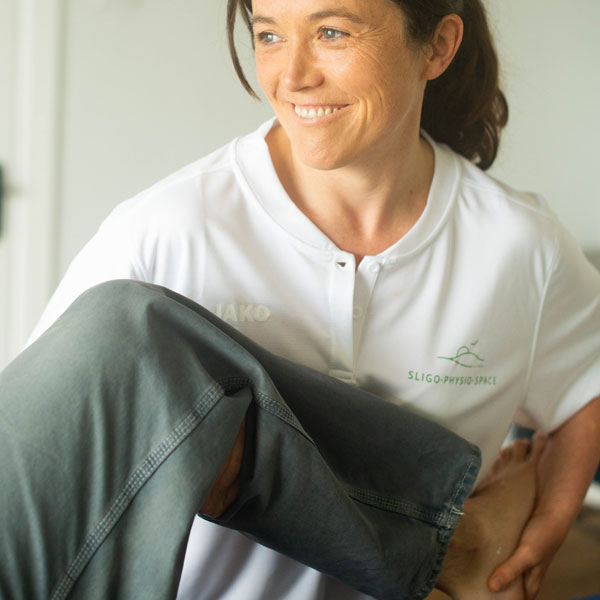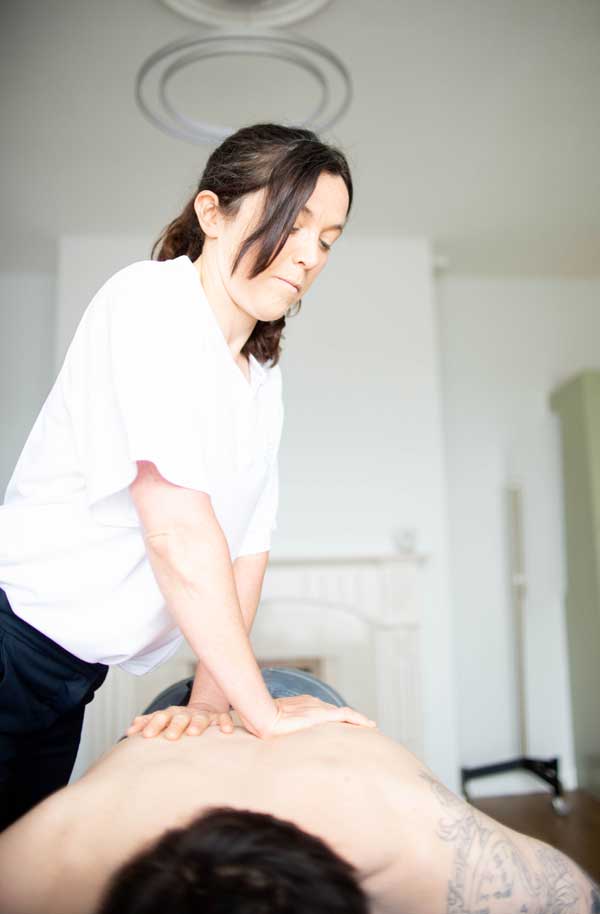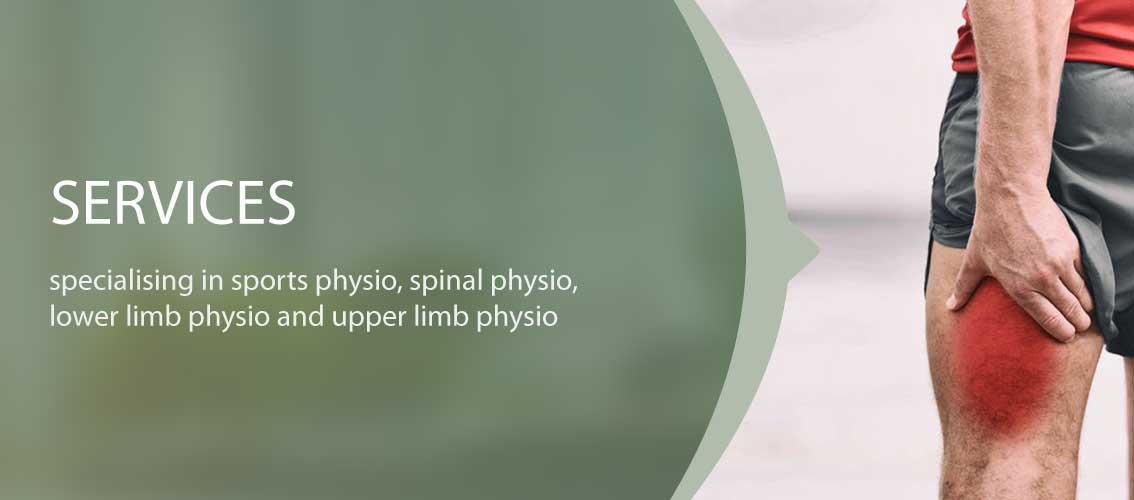Sports Physio
We have vast experience in sports injuries here at Sligo Physio Space, whether you are a weekend warrior or a professional athlete, you are in safe hands. We have extensive knowledge of biomechanics and the functional requirements for your sport or activity, which we utilise to get you back to health. With sports injuries it is important we get a detailed assessment of your injury, and use this to provide you with a detailed treatment plan using the most up to date evidence. The key to recovery and prevention of similar injuries is gaining an understanding of the cause of the problem and fixing all potential causes of the problem. Rehabilitation will focus on a speedy recovery and may involve hands on treatment to ease any stiffness and pain, facilitating improved movement by reducing strain on overloaded structures. For a full sporting recovery exercise is essential and we will focus on flexibility, control and strength.
Common Sporting Groups we have worked with:
- Gaelic football
- Hurling
- Rugby
- Soccer
- Surfers
- Australian rules football
- Tennis
- Runners
- Triathletes
- Swimmers
- Weightlifting
- Gymnastics
- Dance and Performance
- Hockey
- Netball
- Cricket
Spinal Physio
The spine, where would we be without it? It provides us with a solid base from which to function. It is divided into the cervical spine (neck), thoracic spine (midback) and lumbar spine (lower back). It is also the most likely culprit that will cause you pain and discomfort and seeking physiotherapy. Each region is susceptible to injury, and most of us will be affected with some form of neck and back pain in our lives. The good news is that as physiotherapists we are extremely experienced in treating your neck and back pain and it usually responds to the correct advice and treatment pretty quickly. However, if your problem is more chronic (long-lasting), you may need some extra sessions to learn how to manage the condition more effectively, but you shouldn’t worry as we are extremely experienced in helping you on the road to recovery from pain.
Common Spinal Conditions we treat:
- Facet joint sprain
- Disc irritations
- Sciatica
- Spondylolysis
- Spondylolisthesis
- Chronic lower back pain
- Scoliosis
- Wry neck
- Headache
- Migraine
Hip, Knee and Ankle Physiotherapy
We love treating your lower limb injuries, and having worked in physiotherapy in the hospital and sports settings we have seen a lot of lower limb complaints. The lower limb includes hip and groin problems, knee problems, and foot and ankle problems.
We have experience in sports, surgical, traumatic and chronic complaints. The initial aim of physiotherapy treatment will be to settle your pain, then restore your movement, strength and function. Your physiotherapy treatment will involve taping or bracing, massage, dry needling, exercise management, walk/run analysis and correction. You will be advised by your physiotherapist on reloading your joint and safe return to activity.
We are also extremely experienced in post-surgical lower limb conditions and have worked with numerous surgeons in following post-op protocols to enable safe return to your daily activities or sports.

Common lower limb conditions:
Hip/groin
- Hip OA
- Hip labral tears
- Adductor tendinopathy
- Pubic symphysis dysfunction
- Hip flexor issues
- Quad tears
- Hamstring tears and tendinopathies
Knee
- Meniscal tears
- ACL tears
- Illiotibial band friction syndrome
- Medial collateral ligament (mcl) sprain
- Patellar tendon issues
- Patello-femoral joint issues
- Osgood Schlatters disease
- Osteoarthritis
- Chondromalacia patella
Foot and Ankle
- Achilles tendon issues
- Calf muscle tears
- Shin splints
- Ankle sprains
- Stress fractures
Shoulder, Elbow and Wrist Physio
The shoulder and elbow are commonly injured areas of the body. These injuries can be the result of trauma or repeated daily use. The shoulder is the most mobile joint in the upper body and has a complex interplay of muscle and ligaments acting on it to control movement and function, therefore injuries to the shoulder require careful examination and treatment. The elbow is a hinge joint and when injured can cause serious issues with stiffness, it is often the site of overuse injuries too. The wrist is susceptible to fractures and sprains. Careful assessment and management of your upper limb injury by your physiotherapist is vital to give you a speedy recovery.
Common upper limb conditions we treat:
Shoulder
- Rotator cuff tears/tendinopathies
- Labral tears
- Biceps tendinopathies
- Shoulder bursitis
- Dislocated shoulder
- Shoulder OA
- Adhesive capsulitis (Frozen shoulder)
- AC joint injury
- Shoulder instability
- Rotator cuff repair
- Thrower’s shoulder
Elbow
- Tennis elbow
- Golfers elbow
- Hyperextension injuries
- Ligament injuries
- Fractured elbow
Wrist
- Fractured wrist
- Fractured scaphoid
- Carpal tunnel
- Wrist sprain
Corporate Physio
Sligo Physio Space specialises in Corporate physiotherapy services. Given our experience in musculoskeletal physiotherapy, yoga and pilates we are in a prime position to help your company achieve its corporate wellness goals.
Services offered include:
- chartered physiotherapy appointments
- onsite massage appointments
- onsite yoga and pilates classes
- injury prevention screening.
Corporate physiotherapy aims to enhance your organization and culture through reduced workplace injury, increased productivity and fewer employee sick days.
Benefits of introducing this service in your workplace include:
- Decreased absenteeism
- Improved employee productivity
- Improved mental health with reduced stress levels
- Reduction in work related/overuse injuries
- Improved physical activity levels
- Improved postural awareness
We treat:
- Back pain
- Neck pain
- Sports injuries
- Work related injury
- Repetitive strain injury
Neurological Physio
Neurological physiotherapy specializes in treating movement and function disorders caused by conditions affecting the nervous system, including stroke, spinal cord injuries, multiple sclerosis, Parkinson’s disease, and traumatic brain injuries. These services focus on improving mobility, balance, coordination, and strength through targeted exercises, gait training, and adaptive techniques. Treatment plans are individualized to help patients regain independence, reduce disability, and enhance quality of life through evidence-based rehabilitation approaches.
Tuulia has extra experience in the BOBATH concept and neurological rehabilitation expertise studies. She has worked with MS, Parkinson’s, stroke, spinal cord injury, cerebral palsy and motoneuron conditions.
Jenn has also worked with spinal cord injuries, traumatic brain injuries and stroke.
Adolescent Physiotherapy
Active children and adolescents are vulnerable to particular overuse injuries as their growing bodies struggle to cope with the demands of sport and exercise. At Sligo Physio Space we have extensive experience in youth sports physiotherapy and are adept at assessing adolescents and their specific injuries, we will then prescribe age-appropriate treatment and exercise to help target such injuries. Physiotherapy that focuses on stretching and strengthening are essential to allow children and athletes to continue to enjoy the benefits of sport and exercise.
Vestibular Physiotherapy
What is vestibular rehabilitation?
Vestibular rehabilitation is a specialised form of physiotherapy that treats the various causes of dizziness, helping you get back to normal as soon as possible.
It consists of:
An individualised assessment to determine the cause of your problem. This includes specific tests which allow us to identify what part of your balance system is not working properly.
Certain measurements are taken to allow us to monitor your progress over time
Special treatment manoeuvres (if appropriate)
An individualized home exercise programme for you to work on at home. Exercises focus on bringing on symptoms to ‘desensitise’ the vestibular system, learning to coordinate eye and head movements, improving balance and walking skills
Education about the condition and how to cope and become more active.
Does it work?
There is a growing and consistent body of evidence to support the use of vestibular rehabilitation for people with dizziness, including a Cochrane review in 2011. For a lot of people, vestibular rehabilitation results in a complete resolution of dizziness/imbalance. Depending on what your particular problem is, this may occur within 1-2 treatment sessions, or it may take 6-8 weeks of exercising to improve.
For other people, symptoms will improve but not totally disappear. In this situation, the physiotherapist will help you to manage the condition and ensure it has the least possible impact on your life.
Who can Vestibular Rehabilitation help?
- Benign paroxysmal positional vertigo – BPPV (tiny crystals in the inner ear disrupt the normal function of the inner ear)
- Neck related balance disturbances
- Ménière’s disease (a change in the thickness of the fluid in the inner ear)
- Vestibular Neuritis and Labyrinthitis (inflammation often caused by a viral infection)
- Toxicity of the ear caused by medicines
- Age-related problems
- General imbalance/dizziness problems
Sports Massage and Physiotherapy
Do physiotherapists use Sports massage?
Yes as part of a comprehensive treatment program that includes exercise, advice and load management, your physiotherapist will also incorporate sports massage.
What is Sports massage?
Sports massage incorporates specific massage techniques to effect muscle, tendon, ligament and fascia. It is generally applied to a focal point where the athlete is complaining of pain, dysfunction or reduced performance. The main aim is to reduce pain and swelling, release muscle tension, relax the nervous system and allow post activity recovery. Massage is a great way to release tension and pain in order to help you do specific exercises that will in turn have a longer-term effect than massage. Sports massage improves circulation and lymphatic drainage which facilitates removal of waste products such as lactate or lactic acid that can build up following strenuous activity. This can help reduce pain and aid recovery time.
During sport and daily activities tension can build up in the soft tissues that are being used. Especially in muscle that is weaker, or where stress and tension is stored and especially if you have a history of injury or pain in this area. This does not mean that you have an ongoing injury and unfortunately, massage will not cure the problem. The aim of sports massage is to give temporary relief and your physiotherapist will then assess why you are building up tension in this area and give you the correct advice and exercise to manage and prevent the ongoing build up of tension
What does a sports massage do ?
Sports massage is a form of manual therapy, a targeted and systematic approach to muscle recovery and pain relief. It is designed to improve overall range of motion and muscle extensibility, as well as support safe and effective movement. Sports massage can help reduce muscle pain and tension, decrease neurological excitability, and increase joint range of motion and flexibility
What is the difference between a massage and a sports massage ?
A sports massage is a more targeted massage to areas of pain or tension, it focuses on alleviating this tension to allow recovery from sports.
Is it good to have a sports massage?
A sports massage is good for reducing tension and allowing you to recover for your next activity
How often should I get a sports massage ?
It is a personal preference, if you are training more and don’t have time for recovery, more often, if you have pain it can be helpful, it is very variable but your therapist will give you guidelines.
Does sports massage reduce pain?
Yes massage is effective for pain management, it creates neuromodulation which means when we get a massage it sends information to the brain to tell the muscles to relax, thereby reducing muscle tension and pain
Will a sports massage help with tight muscles ?
Yes the same way it helps with pain – by reducing excitability and tension in the muscles
Is sports massage the same as physio ?
No Sports massage does not involve an assessment of an injured area, it is a generalised approach, and not targeted to injured tissue only. Sports Physio is a healthcare profession, that assesses the person, their injury and provides evidence based treatments that may involve sports massage.

Why choose Sports massage with Sligo Physio Space?
When it comes to hand on skills, chartered physiotherapists are experts and sports massage is one of these skills that can be used to help you with recovery.
Your massage therapy will be carried out in a professional, safe & clean environment.
All physiotherapists at Sligo Physio Space are chartered physiotherapists and are fully insured and regulated by the Irish Society of Chartered Physiotherapists, giving you peace of mind that you are in the safest of hands.
You can claim back a portion of your treatment if your insurance company covers physiotherapy.
Your session will include the most up to date advice & exercise prescription to help you relieve your own pain and prevent further episodes and improve sporting performance.
So book online now for a detailed assessment and sports massage.


